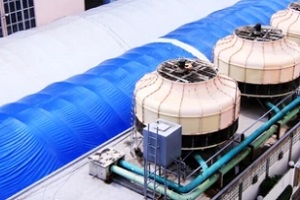 Cooling towers are a vital part of keeping your building functional and comfortable, and for as often as they are used, it should come as no surprise that they suffer from their own set of problems and upsets. While a good water treatment plan can avoid many of these issues, a plan that is not properly balanced for your local water composition and the specific needs of your tower could leave vulnerabilities for your cooling towers to experience some of these issues.
Cooling towers are a vital part of keeping your building functional and comfortable, and for as often as they are used, it should come as no surprise that they suffer from their own set of problems and upsets. While a good water treatment plan can avoid many of these issues, a plan that is not properly balanced for your local water composition and the specific needs of your tower could leave vulnerabilities for your cooling towers to experience some of these issues.
Be sure to keep your eye out for these most common problems that cooling towers face, as well as learn more about how you can deal with them and keep them from becoming a recurring nuisance.
Corrosion Of Inner Materials
When it comes to how water can impact the interior workings of your cooling tower, corrosion may be the first thing that comes to mind. In closed loop systems especially, chlorides and even air bubbles can eat away at the metals that make up your pipes and machinery, leading to corrosion. For some facilities, the first sign of a corrosion issue comes much too late, after a leak has already developed in a pipe due to the material wearing down over time.
Be sure that you are evaluating what your water is made of so that you can understand not only particulates that may be harmful to the materials comprising your system but also so that you can measure attributes such as pH and adjust accordingly. Depending on your issue, you may be able to chemically bind unwanted composites or use filtration to solve the problem.
Scaling on Surfaces
Like corrosion, scaling becomes a regular issue in cooling towers as well. Most commonly, scaling is caused by minerals in the water, which will vary depending on where you get your water from. Calcium is a frequent culprit. When the minerals travel through the water and break down, they settle on the interior surfaces of your cooling tower in scales or deposits. Since your tower needs to conduct heat exchange through surfaces, thickening the surface with mineral deposits will cause your tower to work harder to achieve the same result.
This costs you money in both the short and long term on utility bills, not to mention the potential that these deposits will foul important equipment such as fans and prevent them from working properly or at all. Adjusting your water hardness and removing many of the culprits behind scaling can keep your system running for as long as possible and reduce your overall utility costs.
Biological Growth In The System
You may be focused heavily on Legionella development in your cooling tower because prevention of this bacteria is mandatory in order to remain in compliance with local and state laws. However, Legionella is not the only issue that you must face; remember that water can carry E. coli, giardia and a host of other problematic organisms as well.
You may also see the development of biofilms, a common problem in cooling towers that not only provides shelter and food for Legionella and other bacteria but also runs the risk of damaging your system by clogging filters and other important pieces. The use of biocides is a common response, but which biocide, its application and how frequently it is utilized will depend upon your specific building.
Excessive Noise During Operation
Cooling towers are notorious for producing significant noise—so much so, in fact, that they can sometimes run afoul of noise regulation laws. The most common culprits in a noisy cooling tower are the fans and the motors that power them. Be sure to use aerodynamic fans whose blade profiles are optimized for your type of system.
You can also consider variable frequency drives to power them, which can reduce sound by regulating how fast the fan rotates based on the demand placed upon the tower. Other noise reduction solutions include float mats that can intercept loud water droplets before they hit the bottom of the basin, louvered inlets for air and the installation of silencers that absorb sound.
Trust The Professionals To Keep Your Cooling Tower Problem-Free
Almost every cooling tower will encounter some sort of unexpected problem at some point. The good news is that you can use this as an opportunity to set things right, both now and in the future. The experts at Tower Water would be happy to help you understand the type of water treatment and cooling tower management that is right for your facility to avoid all of these common problems and keep your system running well for years to come. Reach out to schedule an appointment.
